Some say Adolf Hitler didn't really die outside his bunker. With no legitimate proof, it is not hard to see why. Let's take a look at the life and disappearance of Hitler.

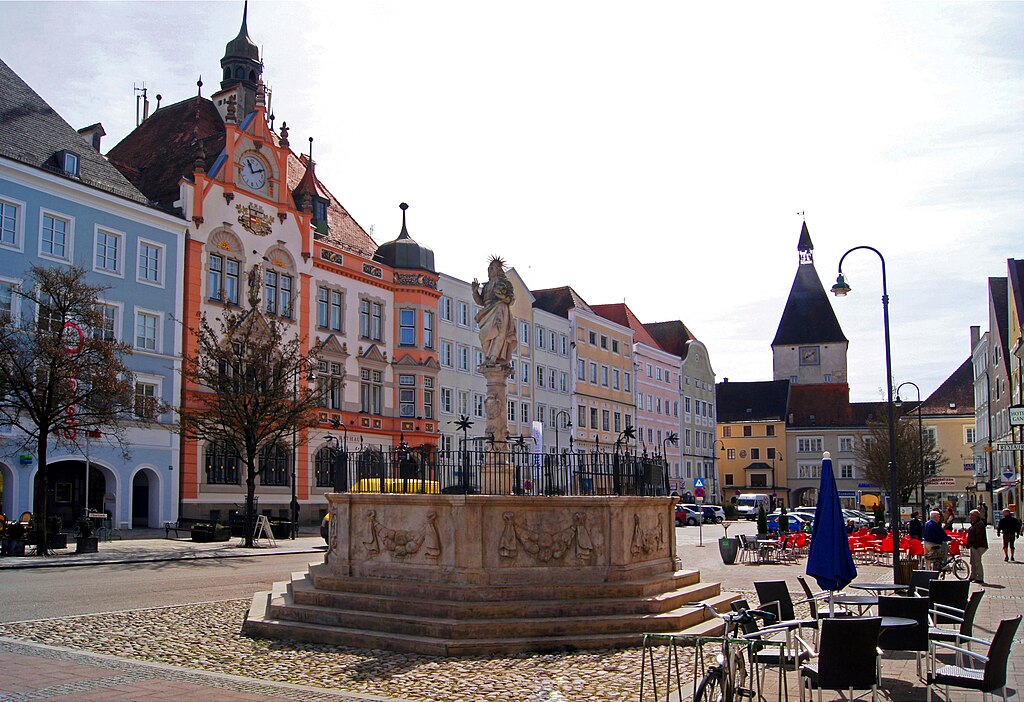
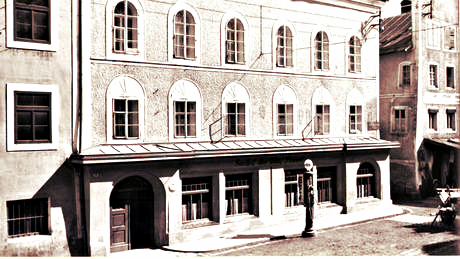

Hitler's parents rented rooms in connection with his father's job as a minor customs official.

 Hitler was the fourth of six children born to Alois Hitler and his third wife and former maid, Klara Pölzl. Three of Hitler's siblings died in infancy. Also living in the household were Alois's children from his second marriage: Alois Jr. and Angela. Alois Jr. would later describe Hitler as quick to anger and spoiled by his indulgent mother.
Hitler was the fourth of six children born to Alois Hitler and his third wife and former maid, Klara Pölzl. Three of Hitler's siblings died in infancy. Also living in the household were Alois's children from his second marriage: Alois Jr. and Angela. Alois Jr. would later describe Hitler as quick to anger and spoiled by his indulgent mother.



Two days after Hitler was born, he was baptized by Ignaz Probst at St. Stephans Church.
 In August of 1892 Hitler's father had been promoted and the family moved to Passau, Germany, also known as Dreiflüssestadt.
In August of 1892 Hitler's father had been promoted and the family moved to Passau, Germany, also known as Dreiflüssestadt. 

Passau is overlooked by the Veste Oberhaus, a 13th-century hilltop fortress. For most of its time, served as the stronghold of the Bishop of Passau.
While in Passau, Hitler acquired the distinctive lower Bavarian dialect.
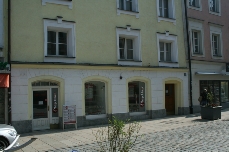 The family lived in a house on the Theresienstrasse, which was almost directly across the street from a building where Heinrich Himmler lived as a small boy a few years after.
The family lived in a house on the Theresienstrasse, which was almost directly across the street from a building where Heinrich Himmler lived as a small boy a few years after.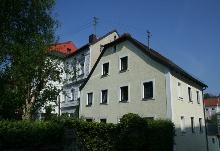



On May 2nd, 1893, Hitler's family moved to a house on the Kapuzinerstrasse.
On March 24th, 1894, Hitler's brother Edmund was born.

In April Alois work transferred him to Linz, while the rest of the family stayed in Passau.
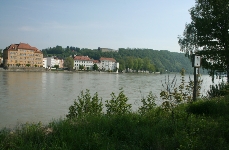 When Hitler was four years old, he would play with other children behind the building and on the river bank. In the winter of 1894, he allegedly fell through the ice and was rescued by one of his playmates named Johann Kuehberger. Kuehberger was the son of the building’s owner. Hitler never really talked about this. He would only mention that he use to play "cowboys and Indians" on the river bank.
When Hitler was four years old, he would play with other children behind the building and on the river bank. In the winter of 1894, he allegedly fell through the ice and was rescued by one of his playmates named Johann Kuehberger. Kuehberger was the son of the building’s owner. Hitler never really talked about this. He would only mention that he use to play "cowboys and Indians" on the river bank.

In February of 1895 Alois bought a farm in Hafeld where he kept bees. In April of that year the rest of the family joined him and the children started helping out with chores. Later in life Hitler would reminisce about his father and the beekeeping.
"It was the most normal thing in the world to be stung by bees. My mother would pull out as many forty-five or fifty stings from the old gentleman when he returned from clearing the hives. He never protected himself in any way, except smoking all the time. In other words, it was a good excuse for another cigar!"
At the time Hafeld had about two dozen houses and a population of 100.
Hitler was top of his glass for awhile and also received good grades in his manners class.
Hitler's father retiring on pension in June. He was a very strict man and when Hitler would disobey him he would get beat by Alois. Hitler's mother tried to protect him.
Alois Jr. bore the brunt of his father's his harsh words and occasional beatings. The next year Alois Jr. ran away to get an education in hotel business and never saw his father again. With Alois Jr. gone, Hitler felt the full force of his father's fury.
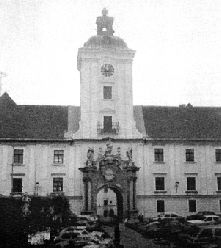
Hitler idolized the priests and for two years seriously considered becoming one. He really admired the Abbot in charge, who ruled the monks. At home Hitler sometimes played priest and even included long sermons.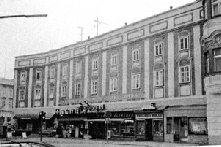
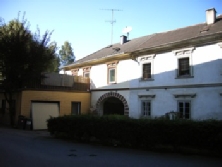 In January of 1898, the Hitler family moved to the second floor of the Schmidts Muehle of Hausher Zoebl. (a house belonging to a miller named Zoebl.)
In January of 1898, the Hitler family moved to the second floor of the Schmidts Muehle of Hausher Zoebl. (a house belonging to a miller named Zoebl.)
Sometime during 1898, at age nine, Hitler was caught smoking a cigarette by one of the priests, but was forgiven and not punished.


 Hitler went to fourth grade of Elementary school.
Hitler went to fourth grade of Elementary school. One day, Hitler went rummaging through his father's book collection and came across a picture book on the War of 1870-71 between the Germans and the French.
One day, Hitler went rummaging through his father's book collection and came across a picture book on the War of 1870-71 between the Germans and the French.
![Bluetenstrasse 9 [Linz, at] - Apartment that Adolf Hitler lived in ...](data:image/jpeg;base64,/9j/4AAQSkZJRgABAQAAAQABAAD/2wCEAAkGBxMTEhUTExMWFhUVFx8aGBgYGB0XFxcYGhoXGBgXGBgYHSggGBolHRgXITEhJSkrLi4uGh8zODMtNygtLisBCgoKDg0OGhAQGy0lHSUtLS0tLS0tLS0tLS0tLS0tLS0tLS0tLS0tLS0tLS0tLS0tLS0tLS0tLS0tLS0tLS0tLf/AABEIAKgBLAMBIgACEQEDEQH/xAAbAAACAwEBAQAAAAAAAAAAAAAEBQIDBgABB//EAEoQAAECAwUCCgcFBgQFBQAAAAECEQADIQQFEjFBUWEGEyJxgZGhscHRFDJCUlOS4RUjYoLwM0NjcqKyByTC8RZEk9LiNFSDo7P/xAAYAQADAQEAAAAAAAAAAAAAAAAAAQIDBP/EACIRAAICAwACAwEBAQAAAAAAAAABAhESITETUQNBYTJCIv/aAAwDAQACEQMRAD8An6TJPtyT+c+cSCZR0l9C/pC3jJJ9o9QMcUSD7Q+WDM3xGfosv3QeZQ8REfQ0e4rrTCtVkkn2k/K0eegS3otPWRDyXoWLNBInYEthUz7urOFF5TAZ4UoMChhTYa5c8CzLIAKLPQs+cBrsxUalSmORU/OzmE5oWLFXDRRSpCkKJQsMU1YLTkWO0HshRZ78nIDJUwzyBr0w0vS7MQJGYyLwomWBTa98TkJxYUjhPPBqQfy+UF2bhdMQScCS+bg+cZ5co4miaZCoeQqNHaOF2NJCpMuo8CNRGeE0R3EHd1x7xRhZsMRwi/ZIsnEcSeNf9riYeuVZPWjDohWmdq8BrQQTSL5ckt6h6jDchJG3u2/7MmVLQZ89KggBWeEEe64IAim9rwkTMBFpWpn9ZKSzt+Dd2RjjKIzSR+UxBSNoPbBnaoaVGuQJDf8AqEdKAPKIz0ywklM+USBkxc7hy4x6jsMSUA+cKl0eTNdcEwLmKQpYdnGEsSdW2sI1l03OgoJUSTiNXqzD6xguCk9EtZmFC1qFElKSQl8zvLdkbu6r4CgcIFDUF0kE6EEQ0k5WF6PZ13KCiEIKgNhr2kR4LHMH7uZ0HyJgqcBMLkHa2JLbNsRTZBpjHMR4KisAyBzJWM0TupR8IiUnJl9KD4iDRJI9uaOvwVHoQrWZMI2EKIhYjyKZ91KCSrklg7YRAsmzKb1S2wKIHVlD6fa0lBTVyG9UjwgezzUe8ImcWuDjL2LjZ1e6v5we8RLjJiQw4wAfyn/TDoKTtEcW2iIqXsdr0IpJmKGIBebHLPWhTSAbTdiFviCqkuHGZzoBnGvs+EJZxmYW2uQMRPFFRJLnEpPNlnGqTrpNqxXb0GbITZ1PxacLMnlckMKvsiq4rGLKvGgkmvrJ2htDDL0cfBWP/kPiIjxSfdmjpSfCHcvYVH0Wz7xUoMWHzDwihFqAowL7CQe0QXYZSSrJWXtN4RK22NJWKaeMJ5VZSqwUzy3JKhzKHgYHWVhJZSirpIO3si8ypNQA53bdjwJaZGZCWAHSfKIWTLbQnKWmqBcckdh1643FyzgiSgMah6rSnOtAS7b4wuL74bCC/M6TH0K5pCUy2YUUfCLd0hRl1GA9BX8JXWk5fmis2NQ/dL6ADv0MawJEyWSAASk7KKbaN8C3TaCo1SRR6kHu54y8e+hkZriCPYWPynnj0SjsX8qufZGmvqYwRQnlPQOaA+cXWRAUgKIIfbQjng8bukwyMkS2qukK59R0RTyXfEB+v0I0cq8UVdwHo4NB0xcbdJPtDqiN+yjJKJUWSsEsfa59BnmOqK5tmVhBdAJzBBBTV6tveNTOXJORD81YS29EtQdWJ6ZEjInm29kVFktGXkTiJhyfI7KFtYYS0El4GXdqguigcTl2pU5ZwWLvmjIo7RBL8Jj+kxJOyIqQ3siPfRp49lPWY8VLn+5/VE7L0TlzZSn5BDbQ361j1ExCvVCm6ooskhdXB9atcmERkpmppgUQKOGOVIbEhmlaGqFdmyIzBL/EIC9IUM5a/ljxVq/Cr5T4RNv0VoEvaShnSS77IOsSUMApi2xj+su2FdvmO2eewjvh1dqEYUgy/ZHKIGbO+6ojT6IXRvZZ0tIZKQN2/ui8SZavWUH5vKF8ixqDBKcQbMqbbo0Feir+F1KG7bzCIzLxDUWWUMljpeLBZk6LA5lEQsMg/CPzJ3/i3mPDIW7CUuvMdh0O6Gp/gsRsJJ+L/WY94lekz+rzhUZCxnLmjo59hiYQdk35Vc8PyCwG3FzfiHrTHgs033j/AEwpwn+L8ivKJBR95fSlW/d+mg8gYDUWWZv+VPgI5VnmbP6PKFXHt+86xzbufrj30s/GEPyIMBoqTM2D5T4xFJmDSABb1aTh83Pv5omm8JnxB1/WH5P0MA0zpn6UYim1zN/WfOBftSb74/TfWJJvGbu7IPJ+iwC/T1jRfQ0C2i3hTY8Z/mS/drHfaEz3R2eUQn2tSgxQKfXd+nh+QMC1NqSNof8AD9Yl6VRgXBBFUnzhcucqrpT+n/XTFCidie3fvh+QMSbDGCSAACHPZGyu69ZOD9qgV1O4Rgp1tQCxYbgT4RpLovVKZYCZaWfXlF+cw1KxVQEi+iimFCQSfWID7xUbo8sNuQguAh65LTka7YScK2aTvCv9MISEu0NRfshypm/ttrExSHSWD6jVq05olMt6ijAEEBmcFy3+0ZrhbZwFSA3/AC0vxhNZZPKA2kDtgxYZI+gSmwqVVsCmBJ2EZRVZTJwgKwEsHca9Ua2VZUtUZRkl2WWbTPxN+0YOdMIiJqkaReyU+TIIylvocmjPTrGrEAok4jRiwzGVKc8ar7MkHRPzfWJ+gy/dG6sTEbMjaJHLCTQihIpzPtOdYLTYyB6x6/rBF4ygiarY6f7YHmuqqqI0GWLn3RnJWyk6RUEmrF21064HnPQYiK6N3tBUxRI2JGQ+keJsalZJ6TE8GCS7INanac+zniKCpBLKOF2Zn7c4YJs6xqk9XnFZsK9Q4BekFhR7LtB1Pl1vF5UdhipEnPt+sWygUZB06jZvHlCpjtANqRiWkEEMXpQ02RJNqIUfWw9HWd0MJtnCuUP1UQVLuk4sXJNGbft540hwllVmVNIdIBGhxd9ItVaJoUElKeU+r5AnTmj2SicB6g6CIjLExa6gDBv95KhpCStjb0G3VOONSV4eUHDPmKHMc3VEgpQtADDC51rVJOULbytQkFJViq+HCAcmdySNsQsd9ImTUAFeNSgASkZ5B2VlGqIseX1OKUpYDMmpbIfWJzAESQcIKyANHxHMudlT0Qitt/S1PiJDcn1T05HdBFmty57KScSQSPVbQaNXSGKwyXb1BgUF+sluaCBbdstfynyihcpaSleGiAp2IyPTBEq9h8OZ1GM3Gik7BbRaAVoOFfJJd0ndlTdBBtyNiulMXKvlIzQsdBif2yj3VjohDBTbZJoznZhePbJIlzVKGFmy5AFOkVjrTeCZhSlCVkhTnk5BiM+mK0WoS1DIED2lYXfOijFxS6Js9k2KSZxQUJLPTAN1XZohe9kkS8IEuWCXo2eQApvi6TbRxhW3OAp9AHjy2WrEsKALJam1i5yiqVC3ZC1XbJlAFQS5LbOerx4ixWc6joWrziXpomqOacIbprtFTSLpYkY14wnMMSN22JlFdGmD/ZVn0V/9ivEwLIuuWUl1KBciimo7Q44qyn4fW0eGxWY+78xHjEDPnl5WPCsgZBZbmcxo7NZuQk5OBAV+2dKVKCPVBpV6c8O7pkhclBOxuomNauJH+gabcMu0YSuYoYAwAG2uyseK4DSC/wB8odXlCLhX+0k7pZ7zC7gvNJtcgOf2iddheNUYtqzeXnwXRPKVKngYUJQAGyTlnrAkvgShKgRaU0INSNC8e/4mT1J4nCpSaqyJGQRsjJXVbppmyxxsyq0hsatVDfDA316yUYZ6ikPxaqjKoFQYoslx2fAk4GJANFKGnPGjVYpasWJL4gxcmoOjbIySbrlqnTgMSQmYQADRmB1jH5EaxYcu4pLe30KMGSxpsDdULjcSGotY6vKGSEkd0TEpmavluOUDWop+UNAyjiLnTIeEW3yf8zMGwA/0jziVmSHrkkPEy6NFU0plJxrZ9BshHbr/ACaabPoPGAr9vIrWezcNsKGiVGxymo6XRob4O3s+sF2O+iDn1eUIcMc0VgiPIz6HYrQmcNMWhEWmUQWjFXPbihYrz7xt54+gUWgK2iJqi7vYLZZbKI0OmwuH6NYeS0hoTTFsUnQnCed/J4eyUkZCLiSxRJXPb9mD0jziMlcxM3lS/wBpriDDCCdHiyVPnD9z2p/7olJ42bMDoCeLrU1OJKho8THpTFPC9RUmVyWIKqCuiNkKODwa1SCaDjU501EbO8739FCSuUFYyRoWYJ288WXFwnRaZolCSlJIJcpBFNwMbUZOrMNeABMytMZ/uMabgaB6OpuU0w5fyohxevCGVImqlKkglDVCAxcBVHVvjrsvNFpQtcuXhwnCRhAJNDoTSKJKbfbBxZTgmOsFKWS9W3HKJyLzIzlTOo+UStEqYAleAkIJUQ4dm54lLvf+DM+U+UZSNYlFqt2JSCJaxhU5dJ2HdBX2un3Jg/KY9N8DWXMr+E+USF8J9yZ8piSheu80ca9QCnCHBqScqRneG01KzLYuyTplUbRGptl5CZhQlC3xJNU0YKBJ6oDtKLHQ2oNokkKFB0RpEiSMnwbkgptYb/lVnqwmFsuUMOUfSbnsFgmlYs4JOEpXhU3JWC4L7WMBqsV1h04mYsRjyORHrRoRQ6siUS0pUSEgoTmW0eK70t0lQQFLQQFOQ4NMKmLc7RfyRLDF04RhdqhqVDvRoXzlyhMKpgGHAmpS4eoZ2aJlwcekv8ofc6m8IqkyLOSoEIZ6c1DE/SbLtR1fSJKm2U6y+r6RiaGdv2WgFQQ2HRssh4w14OH7hO4nvhdfnFueLbDh0yeD+Cy/ufzHuEaL+SH0zfCpSBMl4kk/daKCc1K2pMBcFpcv0uSyVg49ZiSMiagIBPXBXCmyqXNQwdpYGYHtL2mPOCt3rTa5KimgJq4PsK2GNkYvpoP8TVIeTjxe02EgaI2gxlLnVJ46UwmuZiGcp94bo1P+JtmXMVKCElTYsq+5GXuK6ponySZamE1BJbTGmB9EfRr1XNQicpM1QwoJSGTQ0bMVjLXjLXKIPHLUuY6lZJ2Oaa9EbS12HjErSVECYGLAU5njGzrumTJi3mghCyhOIVYbxESXvhqvwHsVumTCBxsxLnC7ux3ikbAJIz/3jLpuCemqFywQXBr5RrCOtoml9D39mNvckWqbQtyW19kRXaLS0qZQg4ToRsEW37LxWlZwvROreyIFn2f7qYwYttfZGcumkTGzlOox4IdS5MzYf6YITIm+4epHnBkD+K92IBHNGhVLUHxJAI0KUueZs4l6Kv4Q+QeBgyF4f0ziSxB2R9CuKePRw5yUQH2aRnJlkV8If9M+cPrhkk2dThuXoCGo2R1hN2NRcSdonjDmKLT3sY00nSusZXi6gPMzGad/NGps+e53hxExXKtk+v3JIfaK/wBUWWS2TETXVJUOMASKhgU4jtMUptsxyOJUanZWvPFsidMmLA4vDgIUXNSCCKCFHpT4LOGpVNlyiBhZSqKUlOYS2Z3QJwCkKTbEE4WwryWhR9U6JJMFcNSUyZeINyyK19mAOAc0emy8sl/2KjZGL6HcNrLMNsmFIoQnUe6BqYacB5RRJnOPbBYNs3a0hRw/mYbavKqU9xhrwCnAyp+5SMt4X5Q/sQ5t16pEsjBMdbpDJflYdxy3wNIvcgB5MzL3T5RbbkrZBSgnCoqIcCmEiIS76f8Acr6vpGczWJXa70x4WlzBhU/qnYd2+CRfafhzPlPlHir4bOUsdB8o8F8j4Uz5T5RBQNPvdBWhRStIAIqhXtFLZDdCHhxMStMsJcsVPQ09XaIf2y8xMHFplrxKycMKEHVoRcMVqQEKSVgFSnqU5sR4xrHhEgj/AAsSRMnA6pT2Yh4xlbyBTPnj+Kv+9Uar/DW1FU+YCpR5ANST7SRqd8Ir+t0xNpnJC1hpiqBZ2k5PF3ozPol0zQLNIUSw4pNegCKb1vGUEDlhyQQNoCg5G2Pbkm4rHIUSS6KnMnlEdMV2yaEKCylWEJYkJNKwpPQ49KBeUjaOqK02uRiJJGEgNTWr6Rab1lfi+Ux4byk7T8pjE1Et+LlqU8sgjCxYNWvg0dwfmtK/N4CJ31PQsjBoK0bmhRZJhCWG2NIbRnLor4YTWngfw096jHcC5j22Tzr/APzmQdaUypqsU2SsqYBxiFBlkYvu30aTMTMRKWFpdqqOYKTQljQmNLV9M6Cv8VJn3knmV/ojK8H1/wCas4/jS/70xqr4tkm0qCp0qYSmgYFIrnkrdA1ls9klzErTJmgoUFAuTykkEUKsqQNqwUTZ2+9JstMxQlJIlhxyzytg9WkZ6WLUCpXFpGNZW2J2fR6RK233ilzEhKnUzOG1eBv+JlEn7nL8f0jObNIharZagKolwd9qI2wlN+LP7g/N9IfW+wJCULDjFQitd+6FEbM3bJwVOUoZFm6m8I60sJMw7o8tSHmnmT/aInaEjilp2iIZaEgITU03OT40i6Ta06uOkt2GkUCUoBkKoMuSkkAZZiLrOtS6iYlgA/JSQ+tcMSahqkpIevs+0dvPEZ1rSKDF0KUfGLpdkBQXLlTPkNdgYZQHNlqFXQRq6E0G8tSGBZLnhVApQ51Hzh9cA+7V/PrnlGZQFlyOLYmhwA7nfXqjS8H5ARKYF+U77XDwESPFqZucd8Hy7cK5AQJLS6kv7w7xDKfdoICwWBTVO9tN0OKIbFcu8FOWlLNdIIs14qTMdUpYxgJGWYc1JIhfLvNSSQJSmBIzG2LFXuVFI4pQCVAk57dBCj0b4Q4ZXgTJQpIKeW1QK0PPCvgXblG2SgTQ49B8Ne6GN8FM9ASrGAC/JFSa0qN8U3Vd8qRNTNTxxUh2BCWqCk5V1jZV7MnZfw8tChbCA3qJNUpOqtog7gJPKkWh2NZeQA+LsAgW+EyrRN41XHJVhCWCQzAk688SuOdKsxWAZn3hD4gKYcTM38xh2rFs0tpvZCUVRMqcIZLklnyBeF1lvVkgGVMcBvUPlFVsvpGFJAKilWJgM6EaxEcJP4UzoAPjGc2axL7VegUAOLmBlA1SdDF/20n4cz5TAY4Q/wAKZ1Dzj3/iAfCm9Q84jRRK03ujEhRStISSSSg6htBCzhvbEGUgBIURMyUFADknmgi2X6lSVI4uY6gQHSNemA+ECE2hITiwsol8JO6NYcM5Ff8AhxaR6UoBKEvL9l39eXtUYWcKVpFsnji0Hl5krcuAdFgaw04MXWmyzuN44K5JS2FsyC7udkQva5ET7RMn8eBjL4cOTJCc3rlGn0Z7NVwYnA2OSWYAGgcsy1ZO5iy87fL4shy6hyeSqrEPpC66LQiRITKxhWF6sQ7l8tIlab3RyCxLAhgHNWhSeikTF5y9ivlMR+0ZeLEymZvVObvEPtuV7sz5XjjfUk5pX8hjA0Ab7tSF4MD0d3DZs3cYQS9eeH1725EwJCApwTmkiM+k588afGZ/IIEWxYQkvme7dBCrYrGkOGLP074tXdhwywBLd6kP/Vu2wR9nnjhSVhw78OxueDEVgKLct1VoBT9ax7Ita1YXWzrCSdx3QZJu4/eUlVoHBanu7ohKsB4qXRD4wSPbbEHfmHZBiOy+cFpQo8cSQmgwtV2g+yXPNb9s3R9YhPkowqzy3+8PCGaL3l6IX1RMkWmVm6Zv/uD1HzjSXjOGBAeufZCAXgJjhIwsM1nCPqYitMxX7yV/1FeUOOhPYGovMJB0H9oi2f6ioGnSTLXUoIV7qsTNtfKLpinlq6O+IkXHpm78nHBLAJAIIO9sOfS8LrvWUzEsSHUAW1BIcGDr/NJf5/7hC6xn7xH8ye8Q1wzm/wDs3ks0POO+MtwimnjMLsnCC2j1rGjM1gHOo7zGe4SLRiSwONqnTCww9uKJhs2+X+TuDMwibhd0sS2jhq88be5f2T83cIwnBw/ffkV4Ru7nVyCOY9g8obIh/J0n1h/MO+NFNmDi0jVozBKipksCC9cqGLUy5jvjHzK7mhxdA1ZFF2rUS08hyaYcqnfELVdsyWUK45RBWElg1C++LDb1Siyk4nq6S4z5s46femPCkyz6wPQDXsiEtlMW22cuWEkzVF1BLFOEVxPXoEA/a8xlcuoIauQL6a5dsMrdZkr4vClsKnU6cVMJGXOYDN2KwTRTEpTp+7FRz+y+yLxJsj9rLxAYqFL56s+fZA0y9JqgkBVSvC/Vp0w2+zzxoU4w4CD9yKGns9dYoRdighD5pm4mEsAlOL3s8qt0QYibDlyZgLccc2HI1oBXnJg2z3VO+MPk/wDKK1hIOIS1Egvlmyn7mg2XfP8ADPX9ImS2Umei6pvxx8h/7okbonfGHyf+UTF7q+Cr9dES+11fBV+uiFRVi+23XPSlShODpBIZJegfPFSBbSlST+1YAAl0k+y5rls64aWi9yUkGUqobrpqIU26QlSSnCcRbMOM0vTWgMVFEMVi+ZnLqKZVPbWsSTfK3SHDFLmurabMo8N2H731eV6v3fYPd2Rai7+VLPIYJIUOLyO3fFYisDN8TVYQDVSiKbocpTNduMD70nNtrtnC+Rd5SEOzomPSWxUCSM9M3aHCEAKxBCiynbbn9IGtAnsnKsE4+2j5T5xcLsne/L+Uxem8T8JUT+0lfCVGdFWKL0sk2WkFSkkEsyUttOZ5ozswnEeeNTfFtK0BJlqTV3OWvnGWn+sY0+PTM/k4P7MUtVKeqLxxexMZgX8oluLHzfSLkXss/ux1/SKyHRpHlfh6vpEpIlklmPRGVXfkwPyE03mKxwgWfYT1mDIVG1mykMeSnLYIUWKYnCMQ7KwjRfqyWCE9sSVes33E9vnCcrHRsLLOlsSGHRBAtKNvYYxaL5nH92mnP5xZ9qTvcT2+cLKh0NOFi8SEFFWVXShBAPW0Ag/c13d4gaZe80CqUh+fzialtJc7Ae2E3aHFUzP38f2f5/7hC+x/tEfzDvEHXihS8GFLs/aQYos9jmBSSUFgQdNvPAuETTcrHl5TnTg21J2AGphPfExKlpKXfAAXycPUHYc4cTZKVpciqT5k0hRbrOpSnSlwEgbMueCNUV8iZPg6WnP+BXdG8uT1X294EYK7ZakLdQYYSNTmN0bq4JgVLBGRV4CB9CH8hthXhUo1yYU2l/CDk29O/qjNzJ04ksqiWagyrrFYmzveHUIVlUPLxtwooBRoxYZRRZbekqGYDGpFISz7bNSwKxXcPKIItczRY7IVjo1sy1ownlVY90U2a3pAqFdUZlNrm7eweUSl2ycSQVNSlB06c0PMMTWfaSNiuqJC8UFgx6RGc9IXhfEX5h5QObXNeiuweUGYsTYotEv3hAVntYFGMZkWqdiAxMDuHlBQmTPiDsgysKNILenYrqjjb0+6rqjO8dM+J3RwnTPid0KwH6ran3VdUFccjaIy3HzPid0VLtM12xP1Q1Kgo0CbUylULOWPlFvpw2K6oyxtM3EA7A7hF0udMaqz1Dyh5Co0QtqaUVQ7vOCUW2UPaEZRM5b+sW6Ivl41KABLb+yFn+BiNxbgcgeyCDaGzSYR2iStOa+mKca/idsF/gUNrxm45akAFy2mwg+EY68BgWyqFnrDqYtYTixkjdCS3qUpbkk0asVF7FJaFa7bKByUCNoA8Y9l3mg5A9nnBMyahXInyw/vDPs8Ip+xkg45asSe6o15tvXDSRnkwedbk5KBFXOXnBFitMuYrAkF2eradMKbzQyyDugzg0j74nYg94h4oSm7HMqwuoscLB6c4HjFiruPvmD7En1j+HxEWrEI0F9lsJAPLOewd7QQLCffV2eUFShQ88WpEIBHeVmw4akvtiSh903N3wRfYqjp8IGmlpfSIllLovTZwMglq51OZGX1iaZO5HU3Vm/NEUTd2p7zFyp5PsmJo1sIlJZWECnJYaZF4gbOKslAYn2XP66Y9E2qejuMRTOIJ5JLkmlYaWgbPOJDFwnI0wtppGludICSAKBXgIza5hI9UinN3xorpVyD/P4CGiZMgiSFBT7R4xI2BAGUW2cUV0eMWgQyRRbbCHS1M+nKPEWBID5wbbPWT0+ES0PNAAptc0y5KlipDd4HjCiXfS1KAZnOdNeiGl6n/LrG7xEZywSyJiCx9YVamYhxiJyoaW68loITnroPCPbDecxSkhwBiSDQGhLZtFPCKXywwOXPoOqPLnFFfzS/7orFE5M1olAqAIf/AGi70NGyJSJGIkvVPbQwTJklRYRCKBxYU7olKu9JLAQ3VIQhJ9pW3fnAqbU3q0i6RFtdKfsUbu2Fs+SElSRmHr+uaGcye53wvnLdSv1nCaHFmMF7TjTjOweUefaU3LGezvaBJKcosIzh4ojJjC67dNVNQkzCxNRTeWyjaWUssDcT00EYS6qTZf8AN5xuEA4ktv7ifCE0XF6GZkhZG/aH0fwjw3cHzHVTviEi0feJGTP3GGbwA2JrQMIWkt6pyDaRlp7BRjU3kl1K5qdUZG1q5UNITZXed2LTUHGnMa00IahG8QJYETMRwYjTIEONtDnzQzuRMwIVxq5SUVITi5aC9QEAVSRo+wwwXZZEwZpfdQxv41LfDnyozdoAmUIBHV1e6Y8uqQmUtRxOCGbUV7YcTLhRoonnPjHC6UBiZYJGuInvMZ+OSLTQwlWdSQcQZ0JI2EEuCCMxFSlROVa1oypplpXVt511j1V5E54Fc6QT2OYzaa+jVUzpRpFqTA5t8vVAHMSD1GO9Ml6EjnHiIQwO+VcpHT4QHblNK/MPGLr2UThUKgZkac+yF1utIUjBkXfsMFWF0VSlBva7YvTXRXb5wGFJAA5ZPPQbGpWOVLSfbX0JI74eKFmwtUhRySevzMemQoAYg28qA8YFRKRqqZ1RckSh8V+YHvgpBkcvCNf6h5xouDCxxShmyxvzEIPu29WYflEF3Xbij7tKSAS5JIgodmjkKbF0eMTxwqk2k4STqWpu/wB4rVbDv6/pCoqw+3TA6enwj2WpweaEtttBIBc0PfEJd4KAZ84dCsKtYBQpLs40zhTJsyQUlyajWmYi+bNelajOIy5A95VG02NDSJlsvvZIUXVoKN0Z7Yps8tKcTfhPUTF06WFB69TZs70ypFXEkO2zbs6Iok2NgQ6sVaUYagkdzQ5lKADFgRn5xkpVtWhJKSz8xipV4LJJJz/WyJSLsf2y2AkgKfo11gcKpChNqO2JC1FvWh2S1YzTk8CrUyuyA1WpW2Im0qZiaQdGtGawAEjYfGJkB+mGAutRJLipLV3xbLudXvDthk0L7Ehpkv8AmHeI2slytLAlnfmYxn5NykKCsYoQWroQYdSlVz07P0Yl9KiNZSOWFH9U+sMioAZjrhCmbSIqnggRJVB1oYqP60jGW8gKy08TGiC4z98/tS+wQ7EwKbNCtWPfFKZzbY9jo1UmYNDO7ipZArz7I0X2bhS+J46OjoS1ZH3QDOYawBapidWMdHRRH2D2GxcfMMtE5MrkuMZOE7gKud24xVOuadhBSBMfII9Y6USmOjowpSdUbq0rE9rK0EgghixGrjMERbZZSFpKlKUDiZgAaMKnt6o6OjJ6KTsMk2WQA5XMV+VotCpHuTT2eMeR0SiiYmSdJEw9P1iaCg5WZfSr6x7HQrKSOXMAzsue0+YjzjPds6Af1ujo6KStCKps+YAwlgVyDmLZYUr2CI6OisRWeT7DNUGwnsiMu6Zmojo6HiiWy9F2LrFkq6FCOjoMUFhCbtMSTdVczHR0PFBYYq7kYGDudT5CKPsf8XZHR0GKCyX2T+Lsicu7APajo6CkFlpu1O09kd9mS2qVdnlHR0KkFnegJG3riabMBl3x5HQ6Q7PRZonxPNXVq9cdHQqQWRFn3mPRIDMDHR0FIZH0euZ8Irn3QiYcSkucnc+EdHQgP//Z)
On January 1st, 1896, Hitler's sister Paula was born.
In April, Hitler went to the Klosterschule in Lambach. 
Hitler stayed at the Lambach Abbey, a Benedictine monastery. The ancient monastery was decorated with carved stones and woodwork that included several swastikas. A wooden staircase led to the classrooms with the rooms where the choirboys would sleep up above, Hitler's teacher noticed that he had a good voice, so she let him sing with the choir boys.

In January of 1897, Alois Hitler sold the farm and moved the family to the Marktplatz in Lambach, across the Benediktinerkloster at the third floor of what later became Gasthof Leingartner.


In November of 1898, Alois Hitler bought a small house in Leonding. The Michaelsbegstrasse 16 had a garden and was located next to a cemetery.

Leonding is very close to Linz and offers a beautiful view of the Alps.

In January of 1899, the Hitler family moved into the house.

He attained good grades with little effort. He also had considerable talent for drawing, especially sketching buildings. He had the ability to look at a building, memorize the architectural details, and accurately reproduce it on paper.
The Franco-German War, also called Franco-Prussian War, in which a coalition of German states led by Prussia defeated France. The war marked the end of French hegemony in continental Europe and resulted in the creation of a unified Germany.
 German nationalism quickly became another obsession for Hitler after listing to his history teacher, Dr. Leopold Pötsch, spew exciting tales of the glory of German figures.
German nationalism quickly became another obsession for Hitler after listing to his history teacher, Dr. Leopold Pötsch, spew exciting tales of the glory of German figures. 
The book became an obsession for Hitler and he would read it over and over again. Hitler stated in one of his own books that this is when he became enthusiastic about war and everything connected to it. This is also when he started playing "war" with his friends.

Hitler had dreams of one day becoming an artist, but his father wanted him to follow in his footsteps and become a civil servant.
In 1901, Hitler repeated his first year of school because he failed physics and mathematics. Being the oldest boy in class gave him the advantage over the other boys. He managed to get better grades in his second year, but still failed mathematics.
The area of Austria where Hitler grew up is close to the German border. Many Austrians there considered themselves to be German-Austrians. Although they were subjects of the Austrian Hapsburg Monarchy they expressed loyalty to the German Imperial House of Hohenzollern and its Kaiser.
In defiance of the Austrian Monarchy, and no doubt his father that used to work for the for them, Adolf Hitler and his young friends liked to use the German greeting, "Heil," and sing the German anthem "Deutschland Über Alles ('Germany, Germany above all')."
On February 2nd, 1900, Hitler's six-year-old brother, Edmund, died from the measles.

He was buried in the cemetery next to the family's home, which Hitler could see from his bedroom window. This event shook Hitler badly. Sometimes he would sit at night on the wall of the cemetery gazing up at the stars.
In May of 1900, Hitler went to fifth grade.
In September of 1900 Hitler's father sent him to the technical high school in the city of Linz. Hitler was considered a country boy. The city kids would look down on kids from the country. He was very lonely, extremely unhappy and had a difficult time with his school work.
In defiance of the Austrian Monarchy, and no doubt his father that used to work for the for them, Adolf Hitler and his young friends liked to use the German greeting, "Heil," and sing the German anthem "Deutschland Über Alles ('Germany, Germany above all')."

One of the figures was Frederick The Great, who acquired his nickname by being a military genius. Frederick II ruled Prussia, a kingdom in what is now Germany, from 1740 to 1786. He made Prussia a major power in Europe.
Frederick’s early life was unhappy. He liked music, art, and literature, but his father wanted him to become a soldier. The king criticized and beat him. At age 18 Frederick ran away, but he was caught. His father put him in prison as punishment.
Frederick became king of Prussia when his father died. He spent the first half of his reign waging war. He took land from Austria and conquered other German lands. Later he added a large part of Poland to Prussia’s territory.
Building a great army was always Frederick’s most important goal. He used most of the kingdom’s money to feed, equip, and pay his soldiers. Frederick also encouraged industry, education, and culture. He wrote poetry and books on history and politics and also composed music.
Hilter also became mesmerized with the operas of German composer Richard Wagner. He loved the Germanic music, pagan myths, and Kings and Knights and their victorious struggles against hated enemies.


Financially, everything was OK for the Hitler family. Hitler's mother received half of her husband's monthly pension, plus death benefits. Hitler received a small amount each month, plus a small inheritance. The family also owned a house in Leonding which had been paid for mostly in cash.
At this time, Hitler was a nervous, awkward boy. He loved to read and draw and that is what he would spend most of his time doing. Despite this, he was a lazy and uncooperative student in school.
When he returned to school after summer vacation, things got worse. Along with his poor grades in mathematics and French, Hitler behaved badly and was hostile. Hitler performed pranks and practical jokes aimed at the teachers. Sometimes the other boys would applaud. Hitler and some of the boys would also release cockroaches in the classroom, rearranged the furniture, and do the opposite of what the teacher told them to do. Some of the teachers wanted Hitler thrown out of school. Dr. Leopold Pötsch was the only teacher that Hitler seemed to have respect for.

 In November Hitler met August Kubizek at the Opera in Linz and they quickly became friends.
In November Hitler met August Kubizek at the Opera in Linz and they quickly became friends. Kubizek was Hitler's only friend in fact. Kubizek was a patient listener as Hitler would often ramble for hours about his hopes and dreams. Sometimes Hitler even gave speeches complete with wild hand gestures. Kubizek would later describe Hitler as "violent and high strung." He also wasn't open to criticism and would throw temper tantrums just like he use to in school.
Kubizek was Hitler's only friend in fact. Kubizek was a patient listener as Hitler would often ramble for hours about his hopes and dreams. Sometimes Hitler even gave speeches complete with wild hand gestures. Kubizek would later describe Hitler as "violent and high strung." He also wasn't open to criticism and would throw temper tantrums just like he use to in school.
Around this time Hitler became obsessed with a young blond named Stephanie. He would stare at her and sometimes follow her. He wrote her many love poems, but never gave them to her. They never even talked. He told Kubizek he was able to communicate with her by intuition and that she was even aware of his thoughts and had great admiration for him. He was also really jealous when she'd pay attention to other men.
 On May 1st, 1906, Hitler was 17 when he took his first trip to Vienna. He went there intending to see operas and study the famous picture gallery in the Court Museum. He also found himself enthralled by the city's magnificent architecture. He would stand for hours gazing at the opera house and the Parliament building, and looking at Ring Boulevard.
On May 1st, 1906, Hitler was 17 when he took his first trip to Vienna. He went there intending to see operas and study the famous picture gallery in the Court Museum. He also found himself enthralled by the city's magnificent architecture. He would stand for hours gazing at the opera house and the Parliament building, and looking at Ring Boulevard.

On the 18th, Hitler's mother was unsuccessfully operated on at the hospital of the "Barmherzigen Schwestern" ('Sisters of Mercy) in Linz. She had one of her breasts removed, but it was too late and the malignant cancer would continue to slowly ravage her body.
Frederick’s early life was unhappy. He liked music, art, and literature, but his father wanted him to become a soldier. The king criticized and beat him. At age 18 Frederick ran away, but he was caught. His father put him in prison as punishment.
Frederick became king of Prussia when his father died. He spent the first half of his reign waging war. He took land from Austria and conquered other German lands. Later he added a large part of Poland to Prussia’s territory.
Building a great army was always Frederick’s most important goal. He used most of the kingdom’s money to feed, equip, and pay his soldiers. Frederick also encouraged industry, education, and culture. He wrote poetry and books on history and politics and also composed music.
In 1902, Hitler went to his second year of technical school. He was the only child in his class, who was excepted from paying annual fees, due to a dire financial condition.

On the morning of January 3rd,1903, Hitler's father went for a walk and stopped at his favorite inn called the Gasthaus Wiesinger. There he died, at the age of 65, from a lung hemorrhage while drinking a glass of wine. This allegedly wasn't the first time he had a lung hemorrhage either.
Hitler broke down when he saw his father's body laying there, at the small church. His father's funeral mass was well attended.
His father's obituary in the local newspaper said: "The harsh words that sometimes fell from his lips could not belie the warm heart that beat under the rough exterior."
In May, Hitler was in his third year of school. To save him the long daily commute, he went to live at a boys' boarding house in Linz where he was attending the technical high school. On weekends, he went back home to his mother.

Also in May, Hitler was 15 and received the Catholic Sacrament of Confirmation in the Linz Cathedral. Once passionate about his faith, Hilter now was bored and uninterested.
In September of 1904, Hitler ended his third year. He had been given a passing mark in French on a make-up exam on the condition that he not return to the school.
After this Hitler moved to a room at boarding house in Steyr and attending school on Steingasse 6. At the boarding house he shared a room with another boy, sometimes they'd pass the time by shooting rats. The first semester Hitler got poor grades in math, German, French, and even handwriting.

On June 21st, 1905, Hitler’s mother sold the house in Leonding. They move to the Humboldstraße 31 in Linz.
Hitler improved during his second semester and was told he might even graduate if he first took a special make-up exam in the fall. During the summer, Hitler suffered from a lung hemorrhage like his father. He regained his health and passed the exam in September 1905. After the exam he decided to celebrate with some other students by getting drunk and passing out. He wound up the next morning lying on the side of the road, awakened by a milkwoman. That was the last time Hitler ever drank alcohol. Hitler never received his diploma. Hitler left school in October saying he fell ill. He never went back.
Hitler's mother urged him to learn a trade or get a job, but he wouldn't listen and so he did exactly as he pleased. He slept late and then he'd go out in the afternoon dressed up really nice with his fancy little ivory cane in hand. When he would come back home he's stay up past midnight drawing and reading.


Years later Stephanie was told about Hitler's obsession with her. She had no idea that he had any interest in her, although she remembered getting one weird unsigned letter.

Hitler also sent many postcards to Kubizek about the wonderful time he was having and about seeing the opera“Tristan und Isolde", directed by Gustav Mahler.
Tristan un Isolde revolutionized classical music forever. It was written by Wagner after falling in love with the philosophy of Arthur Schopenhauer (which is basically the philosophy of pessimism.) He also was involved in an extramarital affair at the time with the wife of one of his patrons.
Tristan is taking Isolde to his uncle King Marke to be his wife. He is in love with Isolde and she knows this. She also loves Tristan though all she wants to do is hate him for invading her homeland, murdering the man she was fated to marry, and then dragging her off on a ship to be married off to someone else. She had healed Tristan during the invasion and had her in his power, but the moment he opened his eyes and pleaded to her for his life, she fell in love with him. She now hates the fact that he would not make her his own but would simply give her away. She decides to kill them both through a poison and begs her friend Brangäne to concoct one for them.
She confronts Tristan and they drink the potion – but instead of a poison, it is a love potion. They reveal their true feelings for one another.
In the second act, the two lovers meet in the night while the King and his men go off hunting. But at the height of their passion, the King and his men barge in thanks to being revealed by Tristan’s “friend” Melot, who also desires Isolde. The King expresses his disappointment and Melot winds up stabbing Tristan.
Now on an island, Tristan is dying with his friend Kurwenal watching over him. Tristan suffers for his Isolde who eventually arrives too late. King Marke arrives to unite the lovers but finds Isolde transcend to another dimension to be reunited with Tristan.
She confronts Tristan and they drink the potion – but instead of a poison, it is a love potion. They reveal their true feelings for one another.
In the second act, the two lovers meet in the night while the King and his men go off hunting. But at the height of their passion, the King and his men barge in thanks to being revealed by Tristan’s “friend” Melot, who also desires Isolde. The King expresses his disappointment and Melot winds up stabbing Tristan.
Now on an island, Tristan is dying with his friend Kurwenal watching over him. Tristan suffers for his Isolde who eventually arrives too late. King Marke arrives to unite the lovers but finds Isolde transcend to another dimension to be reunited with Tristan.
In June Hitler returned to Linz.
In October he started piano lessons.
Hitler was really diving into the fantasy world. He borrowed large numbers of books from the library on German history and Nordic mythology. In November, Hitler and Kubizek went and saw Richard Wagner's opera "Rienzi." Afterward, Hitler led Kubizek atop a steep hill where he spoke in a strange voice of a great mission in which he would lead the people to freedom, just like in the opera.
On January 14th 1907, Hitler's mother went to Dr. Edward Bloch about a pain in her chest, so bad it kept her awake at night. The doctor, Edward Bloch, who was Jewish, examined her and found she had advanced breast cancer. The next day the doctor told the family and Hitler sobbed.
On January 31st, Hitler decided that was enough piano lessons.
Hitler's mother couldn't up the stairs anymore, so in May, Hitler’s family moved to Urfahr, at first to Hauptstraße 46 and two weeks later to Blütenstraße 9.
Vienna is the capital of the Austro-Hungarian Empire. It was the largest German-speaking city in the world, and before the splitting of the Austro-Hungarian Empire in World War I, the city had 2 million inhabitants.
Hitler's mother was by now suffering from breast cancer, but Hitler overcame his reluctance to leave her.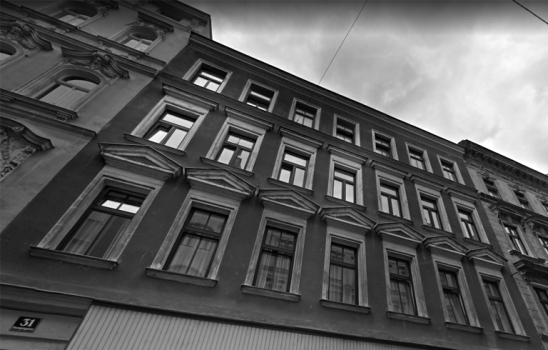
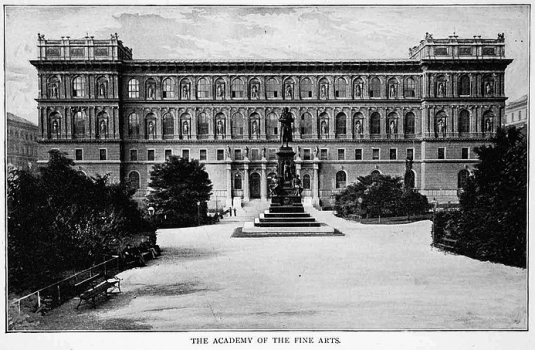 On October 1st, Hitler took the entrance exam for the Academy of Fine Arts. He was among the 33 out of 112 students to pass.
On October 1st, Hitler took the entrance exam for the Academy of Fine Arts. He was among the 33 out of 112 students to pass. 
Iodoform is used as an antiseptic component of medications for minor skin diseases.
 She was buried in the cemetery next that was by their house, the same one her son Edmund and her husband Alois was buried in.
She was buried in the cemetery next that was by their house, the same one her son Edmund and her husband Alois was buried in.

In September, Hitler moved to Wien and a room at the second floor of a house on Stumpergasse 31.


Hitler's drawing of the opera house in Vienna.
The next day, Hitler failed round two in the entrance examination. He was told by the director told his drawings showed a lack of talent for artistic painting, notably a lack of appreciation of the human form and that he should apply to the School of Architecture. Hitler couldn't do this however, he lacked the necessary academic credentials because he had not finished secondary school. On October 22nd, a very depressed Hitler left Vienna and went back home to take care of his dying mother. He did not tell her he failed the exam.
In attempts to save Hilter's mother's life, the doctor recommended a painful, expensive treatment that involved applying dosages of iodoform directly onto the ulcerations caused by the cancer.
In attempts to save Hilter's mother's life, the doctor recommended a painful, expensive treatment that involved applying dosages of iodoform directly onto the ulcerations caused by the cancer.
His mother was moved into the warm kitchen of the the apartment where Hitler kept constant watch. Hitler helped out with household chores. Hitler's mother tried to remain strong as he anguished over every moment of her suffering. Her condition steadily worsened. In the early hours of December 21st, in the glowing lights of the family's Christmas tree, 47-year-old Klara died quietly.

The next day was Christmas Eve. Hitler and his sisters went to Dr. Bloch to thank him and settle the medical bill. The doctor gave the family a break on the charges. Hitler expressed his "everlasting gratitude" for this ("Ich werde Ihnen ewig dankbar sein".
Hitler once again set his sights on Vienna and the art academy. In the second week of February of 1908, Hitler moved back to Wien and back to the house on Stumpergasse 31. The next week, August Kubizek moved in with Hitler. Kubizek had successfully gained entrance to the Vienna Conservatory and was studying music there.
Kubizek said that during this time Hitler didn't seem to be interested in girls and never went out with any. In fact Kubizek said that Hitler steered clear of them and that he didn't believe in sex before marriage.
On April 18th, Hitler wrote a letter to Kubizek who was in Linz for the holidays.
In June, Kubizek was back and he went with Hitler to watch a play of Richard Wagner's at the Wiener Hofoper, called the Walküre.
In July, Kubizek went to serve in the military.
In August, Hitler visited his sisters, Paula Hitler and Angela Raubal.
In October, Hitler tried again to gain admission to the Vienna Academy of Fine Arts. However, his test drawings were judged as so poor that he didn't make it to round two and Hitler was bitterly disappointed.

Hitler's money was running out and in November, Hitler left the Stumpergasse and moved to room 16 a hostel called the Felberstrasse 22.
On August 20th, Hitler left his room at the Felberstrasse. He let his hair grow long and his clothes were warn and looked it. He made no attempt to get regular employment. He eventually pawned all his possessions and actually wound up sleeping on park benches and begging for money.
In November, Hitler lives at the homeless shelter in Meidling, behind the Meidlinger Friedhof on the Kastanienallee. He ate at a soup kitchen operated by the nuns from a nearby convent. This is an area where prostitutes worked.

In February 8th, 1910, Hitler lived at the Männerheim in the Meldemannstrasse. It was a home for poor men. Hitler sometimes earned a little money shoveling snow and carrying bags at the train station. He then discovered he could earn a little bit more selling pictures of famous Vienna landmarks which he copied from postcards.

Another resident at the home, Reinhold Hanish, acted as his agent, hawking Hitler's works of art and posters to various shops.
Hanish was of noble blood, but his family fell on hard times.
On June 21st, Hitler left the Männerheim for 5 days. It’s unknown where he went.
On the 26th, Hitler returned to the Männerheim.
In August, Hitler accused Hanisch of selling Hitler’s painting, a view of the Vienna Parliament, and keeping the entire proceeds of the sale for himself. Hanisch denied this and began painting his own works. He became Hitler’s competitor and supplied others, such as the Jewish frame dealer Jakob Altenberg, with pictures and postcards.
On August 4th, 1910 Hanisch was reported to the police by Siegfried Löffner, who was acting as Hitler's seller. The Vienna police discovered that Hanisch was registered in Vienna under the false name of Fritz Walter.
On August 11th, 1910 a Viennese court sentenced Hanisch went to jail for seven days because of a conflict about money with Hitler.
i hope i don't forget to tell you what happened to Hanisch later.
Hitler also read numerous political pamphlets and borrowing many books from the library on German history and mythology. He examined the philosophical works of people such as Friedrich Nietzsche and Houston Stewart Chamberlain.
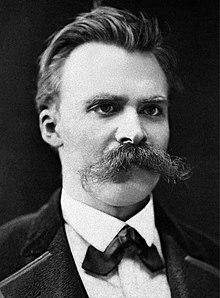
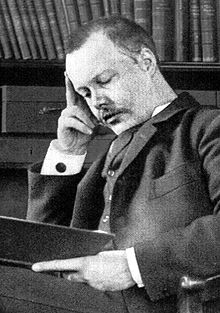
Chamberlain was a British born German and described as "a racist writer" and "Hitler's John the Baptist." He wrote about political philosophy and natural science. Chamberlain married Eva von Bülow, the daughter of Hitler's favorite composer, Richard Wagner. Chamberlain's best known book is the two-volume Die Grundlagen des neunzehnten Jahrhunderts (The Foundations of the Nineteenth Century). The book became highly influential in the pan-Germanic Völkisch which adopted openly ethnocentric and racist ideologies. The book also later influenced the antisemitism of Nazi racial policy.
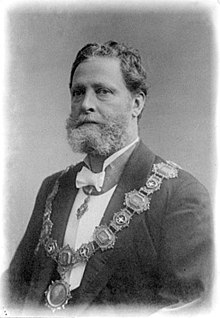
He saw Lueger as a powerful politician and admired him for his speech-making skills and effective use of propaganda in gaining popular appeal. He also was in awe of Lueger's skill in manipulating established institutions like the Catholic Church.
Hitler saw Lueger as a role model whom he studied and tried to mold himself into.
This is when some historians theorized Hitler finally lost his empathy for others. Hitler said this of his experience of his hardships at that time, "I owe it to that period that I grew hard and am still capable of being hard."
Other historians surmised that Hitler only had empathy for his mother and that the father was to blame for his disassociation with feelings for others. Most historians believe, however, that Hitler really lost his empathy for his others and gained a hatred for Jews after World War I.
"Once, as I was strolling through the inner city, I suddenly encountered an apparition in a black caftan and black hair locks. Is this a Jew? was my first thought.
For, to be sure, they had not looked like that in Linz. I observed the man furtively and cautiously, but the longer I stared at this foreign face, scrutinizing feature for feature, the more my first question assumed a new form: is this a German?"
Hitler then immersed read anti-Semitic literature before going back out and studying Jews as they passed by.
"...the more I saw, the more sharply they became distinguished in my eyes from the rest of humanity...
On March 29th, 1911, Hitler’s aunt Johanna Pölzl died in Spital. He inherits the large sum of money.
February 2nd, 1913, February 2, Rudolf Häusler moved into the Meldemannstrasse. Häusler and Hitler became friends and the pair would occasionally go to the opera together.
On Hitler's 24th birthday, he received the finally part of his father's estate.

On February 5th, Hitler journeyed to Salzburg for his medical assessment, which he failed with flying colors. After he was deemed unfit for service, the matter was dropped entirely and he returned to Munich. Hitler continued painting and sold his pictures of landmarks to local shops. When asked how he would make a permanent living, Hitler said it did not matter since there soon be a war.






What was the economic situation in the country during this time? Why was it being ruined? Have you bothered to read Mein Kampf? You might learn something.
ReplyDelete